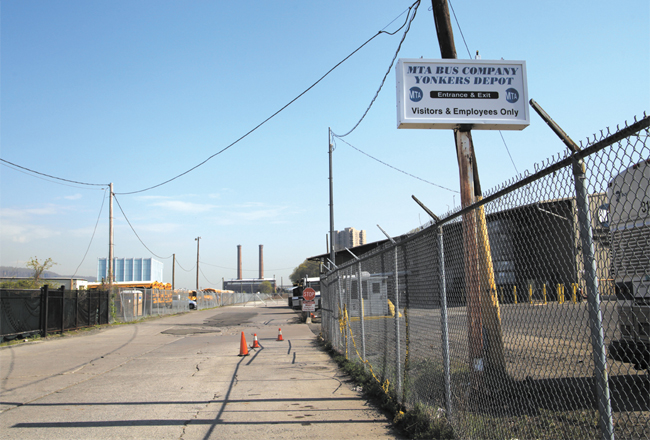 The city of Yonkers is gearing up for legal battle with the owner of a valuable 3½-acre piece of real estate on the city”™s waterfront.
The city of Yonkers is gearing up for legal battle with the owner of a valuable 3½-acre piece of real estate on the city”™s waterfront.
But the party the city plans to take to court is not your average private property owner. The parcel of land at 59 Babcock Place, which stretches north of Alexander Street and west of Ravine Avenue on the downtown waterfront, is owned by New York City.
Yonkers officials say the property, which is leased to the Metropolitan Transportation Authority and used as a bus depot, is necessary for the city and private developers to complete the city”™s master plan for redevelopment along the Yonkers waterfront.
The city aims to use a portion of the property to extend Alexander Street and open access to planned large-scale residential and commercial developments. Officials say the land could also help with infrastructure and parking necessary to complete its master plan.
Mayor Mike Spano said his administration has attempted, without success, to negotiate a relocation deal with the MTA and New York City for its Babcock Place storage and maintenance facility for years.
“I don”™t see what the big deal is,” Spano said. “They”™re occupying some of the most primo property on the water”™s edge with their MTA buses.”
In 2015, Spano sent a letter to New York Mayor Bill de Blasio expressing his frustration with the extended process and his hopes that the situation could be resolved without resorting to the courts.
Since that time, Spano said his administration has made a number of attempts to find a new site for the MTA bus depot and has held multiple conversations with officials of the mayoral administration in New York City.
“That”™s really all we get,” Spano said of those conversations. “We get a lot of, ”˜Oh, this is nice conversation,”™ and then they go cold.”
“Maybe they”™re trying to wait us out, but they certainly don”™t want to deal with this.”
Yonkers officials claim New York City has failed to respond with a reasonable price for the property. The city has asked that Yonkers pay $25 million to fund construction of a new bus garage in addition to the cost of the land. New York City in 2005 paid $10.5 million to acquire the property at the foot of Alexander Street from Liberty Lines Express.
“I daresay if these buses were stored along the Manhattan or Brooklyn waterfronts they would be relocated in a heartbeat,” Spano said.
Requests for comment from both New York City and the MTA were notreturned at press time.
The property sits adjacent to Manhattan-based Extell Development Co.”™s proposed 1,395-unit luxury rental apartment complex. The six-building development with 51,800-square-feet of commercial space would sit on 22 waterfront acres stretching from the former British International Cable Corp. property at 1 Point St. to the Excelsior Packaging plant at 159 Alexander St.
The bus depot, used by the MTA to service bus lines in the northern Bronx and lower Westchester County, also sits north of a 609-unit apartment complex planned by developer AvalonBay.
“It would be a gateway for those two developments,” Spano said of the planned Alexander Street extension. “If the bus garage stayed there, you would have to drive through this bus garage to get to this beautiful waterfront housing. It”™s an eyesore on the waterfront of Yonkers.”
In March, the Yonkers Industrial Development Agency agreed to hold a public hearing on the possible condemnation of a portion of the bus depot property needed for roadway improvements, which would be the first step to an eventual taking by eminent domain.
The Yonkers City Council approved an initial condemnation request in 2015, but Spano said utilizing the IDA is more appropriate since that agency is expected to be involved in the overall Alexander Street redevelopment project.
“It”™s just not fair to taxpayers of Yonkers,” he said. “They don”™t pay New York City tax and they shouldn”™t have to share in New York City”™s burdens.”
Michael Rickon, a Manhattan lawyer who specializes in eminent domain cases, said though it is not particularly common, the use of eminent domain by one municipality to acquire land owned by another municipality has “happened many times before.”
“The general rule is, a government cannot condemn the property of a higher government,” he said, citing a number of cases where New York state acquired property owned by cities across the state.
However, in the case of Yonkers and New York City, when neither is an overarching body, the protocol for invoking eminent domain would be identical to the procedures of acquiring land from a private property owner, Rickon said.
Spano said he believes Yonkers is “perfectly within our rights” to gain control of the property. “They”™re not an overlapping government,” he said. “They”™re a city.”
Yonkers Deputy Mayor Susan Gerry said that while she does not believe it is common for a municipality to condemn another government”™s property, taking control of the site for public use “would seemingly apply here.”
“If you want to take that approach of which public use trumps, or has more value to the public and the community, we believe that sleeping buses on the waterfront is going to lose,” she said.
For Spano, while the looming court battle was one he had hoped to avoid, he is prepared for the fight.
“We keep hearing that it”™s like David and Goliath,” he said. “And that excites us.”















